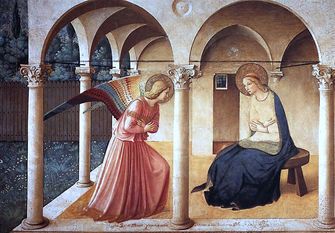 Many years ago one of my cousins brought her family to her mother's house for a family celebration. Her daughter was very young and like most toddlers, she 'told it like it was.' In front of all the guests, who included both family members and friends, she announced loudly to all, "Grandma, you are wearing your wig today!" It was rather embarrassing for her grandmother, who was obviously trying to look her best, but did not need her beauty secrets announced to the world. It is not uncommon to have children make such revelations. Children often have such a sense of innocence that they do not realize when something might be better left unsaid for the sake of what we perceive as good manners. They do not mean to make other people uncomfortable. They are simply trying to be honest. While we cringe at some of their commentary, it is honesty born of their natural innocence that is at the heart of it. That very same honesty is at the heart of Lent, too. It is an honesty that can make us a little uncomfortable because it challenges us to see truth, and sometimes this implies the need for change. This week we hear the gospel story of the Samaritan woman at the well (John 3). As I listened to it being proclaimed at Mass what struck me was the complete and utter honesty of the woman when she was with Jesus. She was trying to avoid the townspeople, which is evident by her going to the well at midday when it was hottest and therefore she would be least likely to meet anyone there. Yet when she met Jesus, she became completely honest about who she was and what her life was like. She held nothing back. There was something about being in the presence of Jesus Christ that brought out the unbridled honesty of a little child in her. And it was her honesty in His presence that seems to have saved her. She accepted His gift of living water, and then in more naked honesty, went back to the very people she was originally trying to avoid and boldly declared that she had met the long awaited Messiah. The strength of her honesty is what made them all go and see for themselves. Recently I have been reflecting on many different saints. What has struck me in spending time with them is their complete honesty, just like that of the Samaritan woman. It occurred to me that this is what sanctity is about: being completely and utterly who we are before God. The saint hides nothing from God, therefore letting God guide them. And as they allow the stripping away of all that keeps them from God, they become more authentically the person they were created to be. That complete honesty then becomes apparent to those around them when they live in service and love of the Lord. They become completely transparent in showing us who they are before God, imperfections included, as they share the love they have for God through their service. The holy ones become completely unselfconscious, because like the Samaritan woman, they turn their focus on Jesus and away from themselves.  All the saints have this quality, though they each lived it according to their uniqueness. For example, St. Benedict Joseph Labrè lived his honesty as a pilgrim, which in his day (18th century) meant that he was a beggar. He traveled from his home in France to different religious sites, until he 'settled' in Rome, living on the streets or in church foyers begging alms and then giving them away to those poorer than he. He was infested with vermin, lived in rags, and owned nothing, yet his greatest gift was the honesty of his poverty before God. He allowed himself to be filled with the love of God so that he could share it with others with no pretension whatsoever. He was not proud of his rags or dirty condition, but he lived as he did because he felt it was the way God called him: to reach out to the poor by becoming one of them. He taught them the love of God while he also lived in total dependence on the alms of generous souls. And he was very well loved by many, not just the poor. Another saint who comes to mind, totally opposite in appearance and lifestyle from St. Benedict Labrè, is St. Philip Neri, who was called from an early age to such a deep love that he literally threw off bodily heat. After having a mystical experience at age 25 he became a priest. He began a ministry to young men which eventually became the Oratory, a congregation of priests and lay brothers. His level of honesty was lived through his intense joy in loving the Lord. He had a raucous sense of humor and was known for making those around him laugh. He loved literature and music and led groups in prayer after discussions on such topics. Even when criticized for all his humor and practical jokes, he did not stop being who he was. No matter what saint you study one can see the honesty of being so directed toward God that there is no shred of self-centeredness or the need to wear a mask. Many of them suffered, such as St. Gemma Galgani or St. Padre Pio. There is a cost to living such honesty. In the case of these two, (though they lived in different circumstances), it was in fighting off the jealousy of those around them who did not understand their gifts from the Lord. Both of them seemed to infuriate the devil who attacked them visibly at every turn. But both Gemma and Pio continued to serve the Lord by being who they were, loving Him so much that they did not count the cost as anything but pure joy.  This is also the case with the Virgin Mary. We celebrate the feast of the Annunciation this week, a feast which celebrates her complete and total openness to the Lord. It was because of her purity and her openness to being the handmaid of the Lord that the angel addressed her as being full of grace. He said: "Hail, full of grace! The Lord is with you!" He venerated her, honoring her by saying ‘Hail.’ He acknowledged that she was filled with the Holy Spirit and that there was no room for sin within her, that he was standing in the presence of the holy because the Lord was with her. While he was in awe of her, Mary’s response was one of complete humility: "Behold the handmaid of the Lord. May it be done to me according to your word." That is, "May God's will be my will. I am His in complete transparency and love." There is no greater honesty than the response of Mary, who gave herself over to God just as she was, with no concern for anything but doing the will of the One she loved. Such is Lent meant to be for us. This Sunday the catechumens, in preparation for baptism, began the process of becoming utterly honest before God with a series of scrutinies being prayed during Mass. Those of us in the congregation should be as honest interiorly when we are praying for and with them. We, too, are called to look within ourselves and ask God to heal that which keeps us from Him. Lent is a time of looking more deeply at ourselves and asking God for forgiveness for our sinfulness and for the strength to grow in holiness. We are encouraged to go to confession so that we might grow in the honesty of holiness, which we call humility. We are urged to add prayer and reflection, service and almsgiving so we remember we who we are before God, the greatness of His gifts to us, and in gratitude share what we have with others. We are called to become like the woman at the well, honest and transparent. We should be living so that others know who we are: we are God's and we live such that we bring the message of His love to others so they may know they are His, too. We are almost halfway through Lent. May we ask God for the grace to live honestly, transparently, the love which is His! May we ask for the determination to carry out our Lenten sacrifices so that we may grow in the honesty of the Samaritan woman and that of Mary who declared herself to be God's handmaid! May we have the courage to live the challenge of our Lenten promises so that we can grow in the honesty of true discipleship! And my we grow in gratitude for the great gifts we have been given by the Lord in becoming one of us and giving His life so we might live with Him forever! Let us continue to meet in the Heart of Jesus, who is the Way, the Truth, and the Life! Peace! © Michele L. Catanese The top painting is The Woman at the Well by Carl Heinrich Bloch (1834-1890) and can be found at http://www.oceansbridge.com/oil-paintings/product/60730/womanatthewell The icon is of St. Benedict Joseph Labrè Patron of Homeless and Lost by Fr. William Hart McNichols and can be found at http://www.fatherbill.org/all-categories/product/127-st-benedict-joseph-labre-patron-of-homeless-lost The last painting is The Annunciation by Fra Angelico.
David
3/23/2014 09:01:58 am
Michele,
Carmella Wygant
3/24/2014 01:57:53 am
I cannot thank you enough for the pray: ask God to remove all that which keeps one away from God. There is so much I don't know that I don't know, especially when I have scales covering my eyes. This is a wonderful prayer for lent and everyday for me. Comments are closed.
|
Heart Speaks to Heart
|

 RSS Feed
RSS Feed

